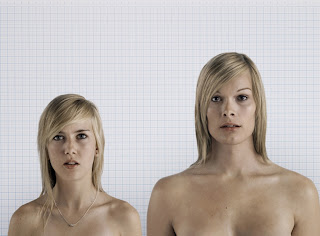Culture has largely shaped gender identities. We have been told that we need to dress one way or act another way because that is what a man/woman does. Even as children we are brought up with boys wearing blue and girls wearing pink, boys play with legos and girls with dolls. This largely within the past few years has become somewhat of a issue within the school system and is something that teachers have been dealing with and trying to address that there is no "norm". Photography has the ability to either further enforce this thinking and idea that a Woman or Man exist as gender rather than only sex. Photography can also and I believe should do the opposite and question these ideas that a Male should act or look one way and a Female another.

When reading through these papers I was trying to think of a modern day artist dealing with these issues of gender and role. I then remember Charlie Whites series of teen and transgender comparisons. He would photograph a teen girl just "blooming into womanhood" and also a male to female transexual. Both who are dealing with becoming a woman and the roles around this word.